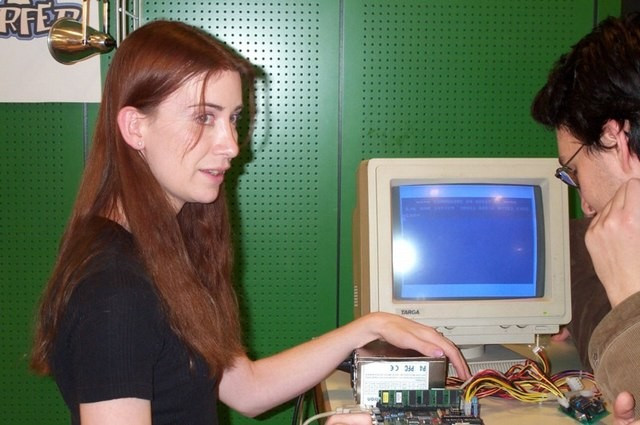Former Valve Hardware Designer Was 'Stabbed in the Back'
Jeri Ellsworth, formerly of Valve's hardware division, has criticised the company's famous "flatpack" management approach, saying she was "stabbed in the back" when she was fired earlier this year.

Ellsworth was laid off from Valve along with her entire hardware development team, as part of a huge corporate restructuring at the Half-Life developer in February. Though Valve is famous for its no-management approach to business, encouraging employees to work independently on projects and democratically vote on hiring and firing decisions, in an interview with The Grey Area podcast, transcribed by Develop, Ellsworth said the company is "like high school" and that there is a "hidden" management structure in place:
"The one thing I found out the hard way is that there is actually a hidden layer of powerful management structure in the company, and it felt a lot like high school. There are popular kids that have acquired power.
"The day I got fired I was walking up to the elevator and one of the mechanical engineers said 'did you hear so-and-so was laid off?' It was someone on our project. I was mad. I hopped in the elevator and went straight up to our team - and I found Rick, and he said 'I was fired. You too.' I couldn't believe it. The handbook said that if you get too far off course they will tell you about it.
"If I sound bitter, it's because I am. I am really, really bitter.They promised me the world and then stabbed me in the back."
As well her own experience with being fired, Ellsworth criticised the Valve business structure for being ineffective at managing people and resources:
"Their structure probably works really well with about 20 people, but breaks down terribly when you get to a company of 300 people. Communication was a problem. I don't think it works. Give people complete latitude with no checks and balance, and it is human nature that they will minimise the work that they do and increase the control that they have.
Precious culture
"We used to joke that it's good at hiring lots of lead guitarists. We went out and hired lots of great makers - but we were all lead guitarists, we couldn't go out and hire someone just to manufacture the parts. We had a machine shop with millions of dollars of equipment in it and couldn't hire a machinist to manufacture machine parts for it, because they were worried that bringing in a machinist would hurt their precious culture."
Ellsworth was formerly responsible for Valve's hardware division, which was reportedly developing augmented reality technology and the long-rumoured "Steambox", Valve's entry into the home console market.
She criticised the company for repeatedly stalling her efforts to bolster hardware development:
"They have a bonus structure in there where you can get bonuses - if you work on very prestigious projects - that are more than what you earn. So everyone is trying to work on projects that are really visible. 'Look at me, I am making all these great improvements to the latest and greatest video game'.
"And it's impossible to pull those people away for something risky like augmented reality because they only want to work on the sure thing. We were starved for resources. When I complained to someone about this he said that 'If communication was important at Valve it would have evolved a long time ago.' Which is insanity."
Abrasive
Ellsworth claimed she was eventually fired for being "being abrasive":
"And I probably was [abrasive] but I just couldn't find a way to make a process to actually deliver any hardware inside that company."
As part of her severance deal with Valve, Ellsworth has been permitted to continue development on the augmented reality CastAR glasses she started working on at the company. No official word on the Steambox has been given by Valve, though Steam's "Big Picture" mode, which optimises the company's digital distribution platform for television, has been seen as an indicator Valve may be moving into living-room gaming via new hardware.
© Copyright IBTimes 2025. All rights reserved.





















